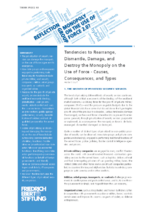Think Piece No. 3: Tendencies to Rearrange, Dismantle, and Destroy the Monopoly on the Use of Force – Causes, Consequences, and Types
Summary
- The privatization of security services can damage the monopoly on the use of force or prevent its emergence.
- Non-state groupsand companies engaged in performing traditional security functions include private military and security companies; militias, rebel groups, insurgents, or warlords; and organized crime.
- Reasons for the growth of private security services include the neoliberal economic ideology, globalization, weak governments, violent conflict and wars, the »war on terror«, humanitarian interventions, public opinion, parliamentary scrunity, demobilization of soldiers and lack of qualified personnel in the armed forces.
- Modes of privatising or dissolving and damaging the monopoly on the use of force include outsourcing (commercialization of military functions), hostile takeover (unauthorized non-state actors take over governmental functions), franchising (non-state actors perform quasi-governmental functions on behalf of foreign governments), and friendly takeover (consensus-based access to personal data by IT companies and governments).
- However, the lines between the different types of privatized security are porous.
Wulf, Herbert
Tendencies to rearrange, dismantle, damage, and destroy the monopoly on the use of force
Berlin, 2015
Zum Download (PDF) (270 KB, PDF-File)
Latest Issues
- Mely Caballero-Anthony, Frieden und Sicherheit | Publikation
Think Piece 22: Security in Times of Uncertainty in Asia
Asias security outlook still appears to be laden with uncertainties. From the changing dynamics in the balance of power, an emboldened North Korea and…
- Ann L. Phillips, Frieden und Sicherheit | Publikation
Think Piece 21: Providing Security in Times of Uncertainty
The final report, distills the findings of a two-year effort by more than 20 international experts to find answers on how to overcome rising…
- Jaïr van der Lijn, Publikation
Think Piece 20: The future of the monopoly on the legitimate use of force - Four alternative global futures
The paper presents four alternative global futures for the monopoly on the legitimate use of force that aim to allow policy makers to embrace…
